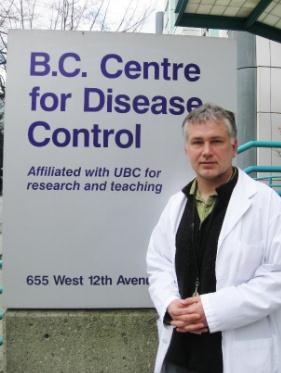Gay and bisexual men are being urged to get screened for syphilis as infection rates hit a historic high in BC, with men who have sex with men [MSM] accounting for nearly all new cases, health officials say.
“Our numbers have more than doubled in the last few years to more than one [new case] a day in BC,” says Dr Richard Lester, lead physician of STI/HIV control at the BC Centre for Disease Control (BCCDC).
“Rates of infectious syphilis are the highest they’ve been in 30 years,” he says. “And so far in 2013 the numbers have been persistently higher than last year, so there’s no sense at all that it’s slowing down at this moment.”
Infectious syphilis is transmitted sexually, caused by the bacterium Treponema pallidum. It is highly contagious, with exposure resulting from close contact with an infected person’s genitals, rectum or mouth.
According to the BCCDC’s 2012 annual statistics count, the number of infectious syphilis cases climbed from 151 in 2010 to 372 in 2012, with MSM transmission accounting for 95 percent of all new syphilis infections in the province.
The high incidence of syphilis is not isolated to BC; numbers are up across Canada. Quebec has seen a spike in infectious syphilis cases over the last year, while in 2010 Alberta saw an increase involving both men and women, Lester says.
Transmission is not limited to a particular age group of gay men in BC, Lester notes. Infected individuals range in age from late adolescence to men in their 60s and 70s.
Women, in contrast, have seen a steady decline in syphilis transmission rates.
To combat the spread of infectious syphilis, the BCCDC is urging regular screening for people who may or may not show symptoms of the infection.
“We recommend that any men who have sex with men who may be at risk get tested as frequently as every three to six months,” Lester says.
“The number-one reason that we care about syphilis isn’t just about the minor skin irritations of an ulcer or skin rash,” he adds. “It’s actually the serious complications we’re more concerned about.”
Left untreated, infectious syphilis can transform into what is known as neurosyphilis, which can affect brain function and lead to blindness, hearing loss and stroke, Lester says.
“There’s a bit of a myth, even in the medical community, that neurosyphilis is a very late component of syphilis, and people often think of it as a tertiary syphilis or something that happens 10, 20, 30 years later,” he says.
In reality, Lester says, most of the neurosyphilis symptoms seen at the BCCDC occur within the first year or two after the onset of syphilis.
Getting tested, diagnosed and treated early is key to preventing complications, he says.
Lester says he doesn’t know why gay men make up the majority of new infections in BC.
“We do know that condom use hasn’t changed much over the past decade, but there may be some factors of optimism regarding better HIV treatment and the reduced risk of transmission due to treatment as prevention,” he says. “Those may be factors, but at the moment we don’t really know why there’s a spike.”
“What’s important, and what we know right now, is that men who have sex with men in Vancouver are in a community that has the highest rates of syphilis and that there is something that they can do about it,” says Dr Reka Gustafson, the director of communicable disease control for Vancouver Coastal Health.
“The primary goal of intervention is to prevent the serious complications associated with undetected syphilis infection,” she says.
Health officials are recommending that barrier protection be used while engaging in both intercourse and oral sex, since syphilis can be spread through sores on the genitals, rectum and mouth.
“It’s definitely an issue for our community,” says Wayne Robert, executive director of the Health Initiative for Men.
Robert is also encouraging community members to get tested and says he would like to see gay men incorporate regular, ongoing syphilis screening into their overall personal health plans.
“You definitely want to pay attention with it and deal with it as early as possible,” he says.
“It’s important to have a good relationship with your healthcare provider and to talk about the kinds of sex you’re having,” he adds.
Wayne Campbell, vice-chair of Positive Living BC, says he has been working closely with the BCCDC to create a campaign aimed at educating men living with HIV about the increased risk of other sexually transmitted infections (STI), including infectious syphilis. Campbell says the campaign launch is scheduled for May.
“The rise is alarming,” Campbell says. “We can see an incredible jump in the numbers.”
Campbell says the connection between HIV-positive men and high syphilis rates isn’t surprising.
“Many HIV-positive men are so engrossed with their HIV that they don’t consider the threat of other STIs,” he says.
Campbell says it shouldn’t be difficult for people to be proactive when it comes to their sexual health. “The easiest thing to do is get a test,” he says. “Knowledge is power.”
For more information on syphilis and testing, visit bccdc.ca.

 Why you can trust Xtra
Why you can trust Xtra


